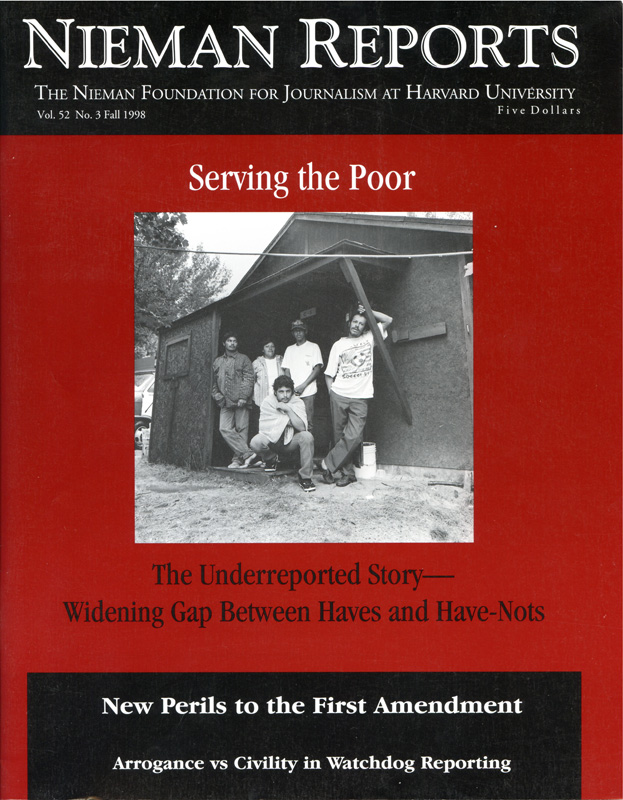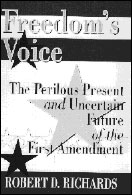The New York Times knew what it was doing when it hired Yale Professor Alexander M. Bickel to argue the Pentagon Papers case before the Supreme Court on June 26, 1971. Bickel, under questioning by Justice Stewart, argued that the injunctions that had stopped The Times (and The Washington Post) from publishing the secret history of the Vietnam War were invalid because Congress had passed no law giving the President the power to seek such injunctions.
Justice William O. Douglas, an absolutist on press freedom, looked down at Bickel and asked:
“Why would the statute make a difference, because the First Amendment provides that Congress shall make no law abridging freedom of the press? Do you read that to mean that Congress could make some laws abridging freedom of the press?”
Bickel: “No sir. Only that I have conceded, for purpose of this argument, that some limitations, some impairment of the absoluteness of that prohibition, is possible, and I argue that, whatever that may be, it is surely at its very least when the President acts without statutory authority because that inserts into it, as well—”
Douglas: “That is a very strange argument for The Times to be making. The Congress can make all this illegal by passing laws.”
Bickel: “I did not really argue that, Mr. Justice.”
Douglas: “That was the strong impression that was left in my mind.”
A few hours later, while waiting for the decision at The Times Washington Bureau, an editor, like so many journalists, an ardent absolutist on the First Amendment, asked Bickel why he had made such a concession. His answer was simple: “You want to win the case, don’t you?” He knew he had Douglas’s vote and that of the two other absolutists, Justices Black and William J. Brennan. He probably could count on the liberal Justice Thurgood Marshall. Needing one more vote, he aimed for the moderates, Justices Byron White and Potter Stewart. Knowing that they would not go along with an absolutist argument, Bickel made his concession. He got both White’s and Stewart’s votes in the 6-3 decision.
While the decision was a victory for The Times, the opinions clearly rejected the argument that press freedom is absolute, indicating that Congress can make laws restricting that freedom. No wonder, then, that the press worries about erosion of its rights.
In “Freedom’s Voice,” an update on the status of the First Amendment, Robert D. Richards, Associate Professor of Journalism and Law of the College of Communications at The Pennsylvania State University and Director of the Pennsylvania Center for the First Amendment, sounds the familiar call to the barricades. He finds erosion wherever he looks—in politics, business, the arts, the courts. Richards expresses no willingness to grant concessions, as Bickel did in the Pentagon Papers case.
In fact, at least in the case of high school newspapers, Richards places the rights of editors over that of publishers, the school principals. He sees “deterioration” in First Amendment rights in a Supreme Court ruling rejecting a Bethel, Washington, student editor’s suit protesting the principal’s killing of two articles, one on three unnamed pregnant students and the other on a named girl’s accusations against her father. Would Richards go so far as upholding the right of the editor of a metropolitan newspaper—say The New York Times—to publish a story over the objections of the publisher? Who enjoys the right, the writer, the editor or the publisher? All, of course, but in the end the principal figure is the one who owns the printing press.
The point is that while constant vigilance is necessary to protect freedom, the press should be careful in selecting the cases it pushes and the legal bases for defending itself.
All this is not to denigrate Richards’s superb job of summarizing attacks on the First Amendment. His sweep is broad, covering television cameras in RELATED ARTICLE
"SLAPPing Down the Debate Over Cuba"
- John S. Nichols and Robert D. Richardscourts, politically correct speech on campus, arts and entertainment, talk radio, the Internet and an “alarming” trend, multimillion dollar defamation suits by businesses designed to stifle political opposition.
While constant vigilance is undoubtedly necessary against onslaughts, especially by government and business, Professor Richards comes up short in proposing a solution. He suggests that the general public should be the catalyst for protecting liberty because so many of the attacks on freedom are at the local level. But he never says how to enlist the public’s help, especially in view of the low esteem the public holds for the media today. Perhaps Professor Richards can write a battle plan in another book.
Robert H. Phelps is the departing Editor of Nieman Reports.
Justice William O. Douglas, an absolutist on press freedom, looked down at Bickel and asked:
“Why would the statute make a difference, because the First Amendment provides that Congress shall make no law abridging freedom of the press? Do you read that to mean that Congress could make some laws abridging freedom of the press?”
Bickel: “No sir. Only that I have conceded, for purpose of this argument, that some limitations, some impairment of the absoluteness of that prohibition, is possible, and I argue that, whatever that may be, it is surely at its very least when the President acts without statutory authority because that inserts into it, as well—”
Douglas: “That is a very strange argument for The Times to be making. The Congress can make all this illegal by passing laws.”
Bickel: “I did not really argue that, Mr. Justice.”
Douglas: “That was the strong impression that was left in my mind.”
A few hours later, while waiting for the decision at The Times Washington Bureau, an editor, like so many journalists, an ardent absolutist on the First Amendment, asked Bickel why he had made such a concession. His answer was simple: “You want to win the case, don’t you?” He knew he had Douglas’s vote and that of the two other absolutists, Justices Black and William J. Brennan. He probably could count on the liberal Justice Thurgood Marshall. Needing one more vote, he aimed for the moderates, Justices Byron White and Potter Stewart. Knowing that they would not go along with an absolutist argument, Bickel made his concession. He got both White’s and Stewart’s votes in the 6-3 decision.
While the decision was a victory for The Times, the opinions clearly rejected the argument that press freedom is absolute, indicating that Congress can make laws restricting that freedom. No wonder, then, that the press worries about erosion of its rights.
In “Freedom’s Voice,” an update on the status of the First Amendment, Robert D. Richards, Associate Professor of Journalism and Law of the College of Communications at The Pennsylvania State University and Director of the Pennsylvania Center for the First Amendment, sounds the familiar call to the barricades. He finds erosion wherever he looks—in politics, business, the arts, the courts. Richards expresses no willingness to grant concessions, as Bickel did in the Pentagon Papers case.
In fact, at least in the case of high school newspapers, Richards places the rights of editors over that of publishers, the school principals. He sees “deterioration” in First Amendment rights in a Supreme Court ruling rejecting a Bethel, Washington, student editor’s suit protesting the principal’s killing of two articles, one on three unnamed pregnant students and the other on a named girl’s accusations against her father. Would Richards go so far as upholding the right of the editor of a metropolitan newspaper—say The New York Times—to publish a story over the objections of the publisher? Who enjoys the right, the writer, the editor or the publisher? All, of course, but in the end the principal figure is the one who owns the printing press.
The point is that while constant vigilance is necessary to protect freedom, the press should be careful in selecting the cases it pushes and the legal bases for defending itself.
All this is not to denigrate Richards’s superb job of summarizing attacks on the First Amendment. His sweep is broad, covering television cameras in RELATED ARTICLE
"SLAPPing Down the Debate Over Cuba"
- John S. Nichols and Robert D. Richardscourts, politically correct speech on campus, arts and entertainment, talk radio, the Internet and an “alarming” trend, multimillion dollar defamation suits by businesses designed to stifle political opposition.
While constant vigilance is undoubtedly necessary against onslaughts, especially by government and business, Professor Richards comes up short in proposing a solution. He suggests that the general public should be the catalyst for protecting liberty because so many of the attacks on freedom are at the local level. But he never says how to enlist the public’s help, especially in view of the low esteem the public holds for the media today. Perhaps Professor Richards can write a battle plan in another book.
Robert H. Phelps is the departing Editor of Nieman Reports.




